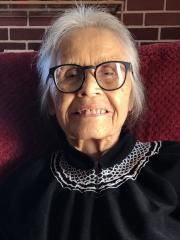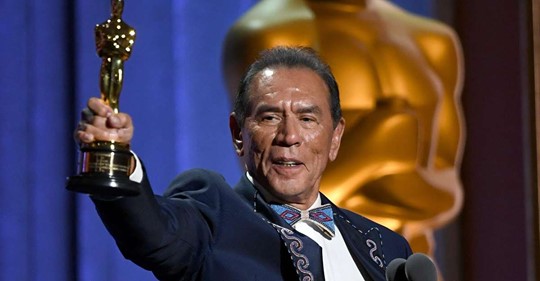Maggie Studie (Cherokee), mother of Native American Academy Award winning actor Wes Studie, passed away on Sunday, October 17. A fluent speaker of the Cherokee language, she taught her tribal language for decades to others. She was 92.

Born in Norfire Hollow, Okla., her preferred language was Tsalagi or Cherokee. Her parents spoke Cherokee at home and as a young girl, she became bilingual by teaching herself to speak English by listening to others and observing the actions of English-speakers and making the connection between the two.
Want more Native News? Get the free daily newsletter today.
She was a strong advocate for the Cherokee Nation to preserve the Cherokee language for future generations.
Maggie married Andy Studie. The couple had four sons, Wesley, Andy Lee, Bobby Lee, and Calvin. As a couple, they made a life for their family working on ranches and farms on the far western reaches of Cherokee Nation and came to rest in Collinsville, Okla. While there they developed their favorite project of teaching the sons music while they were still in school. The boys formed a rock-n-roll band. Andy Senior became their manager and Maggie became a rock-n-roll mom as they traveled from one band engagement to the next throughout eastern Oklahoma.

Studie was also an environmental activist who took part in the successful protest of the planned Blackfox nuclear plant near Inola, Okla. as well as a subsequent demonstration in Washington, D.C.
Studie’s obituary says “she breathed a sigh of relief and thanked The Creator when plans for the nuclear plant were shelved. She held a firm belief that as long as we as people were truthful, honest, and cared for others, Creator would help and take care of the rest.”
Maggie was predeceased by her husband, Andy Studie, her son Calvin, her parents and siblings.
She is survived by her sons Wesley Studie (Maura Dhu), Andy Lee Studie (Karla Reynolds), Bob L. Studie and grandchildren Daniel Studie, Adam Studie, Leah Studie, Bradley Studie, Marsha Studie, Dionne Studie, Chelsea Studie and Kholan Studie and many great-grandchildren.
More Stories Like This
Native News Weekly (August 25, 2024): D.C. BriefsCadiz, Inc. Announces EPA Selection of Mojave Groundwater Bank Northern Pipeline Project for WIFIA Loan Application
Jesse Jackson, Who Bridged Civil Rights Struggles for Blacks and Native Americans, Dies at 84
SAVE THE DATE: GVSU’s “Celebrating All Walks of Life” Powwow Set for April 4th
Monday Morning: (February 16, 2026): Articles You May Have Missed This Past Weekend
Help us defend tribal sovereignty.
At Native News Online, our mission is rooted in telling the stories that strengthen sovereignty and uplift Indigenous voices — not just at year’s end, but every single day.
Because of your generosity last year, we were able to keep our reporters on the ground in tribal communities, at national gatherings and in the halls of Congress — covering the issues that matter most to Indian Country: sovereignty, culture, education, health and economic opportunity.
That support sustained us through a tough year in 2025. Now, as we look to the year ahead, we need your help right now to ensure warrior journalism remains strong — reporting that defends tribal sovereignty, amplifies Native truth, and holds power accountable.
 The stakes couldn't be higher. Your support keeps Native voices heard, Native stories told and Native sovereignty defended.
The stakes couldn't be higher. Your support keeps Native voices heard, Native stories told and Native sovereignty defended.
Stand with Warrior Journalism today.
Levi Rickert (Potawatomi), Editor & Publisher

